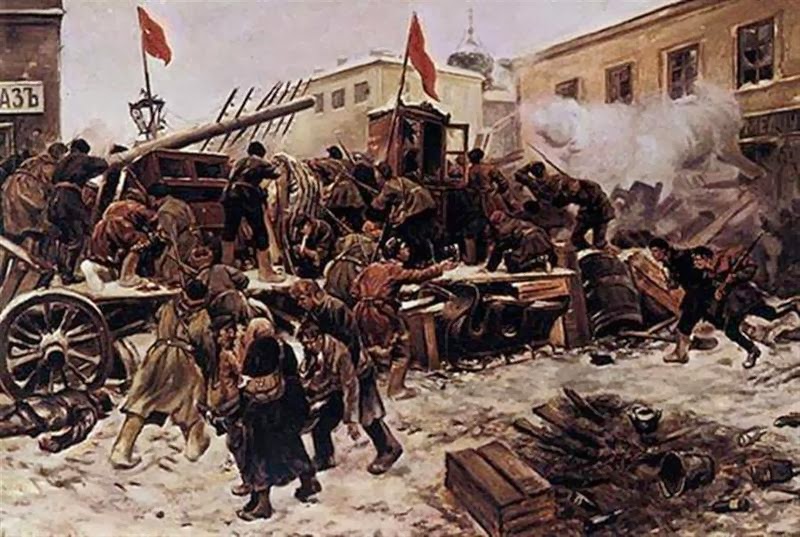Middle
Eastern Studies provides a study Murat Yasar addressing
the influence of the 1905 Russian Revolution on the Young Turks of the Ottoman
Empire. The author states that the
revolution was an important factor in the
political success of the Young Turks.
The barricades of Presnya, 1905 - by Ivan Vladimirov
***
The Bulletin of Spanish Studies: Hispanic Studies and
Researches on Spain, Portugal, and Latin America presents a series of studies
on the Spanish Civil War (1936-1939).
Angel
Vinas discusses the two memoirs of Colonel Segismundo
Casado and their discussion of the March 1939 coup. The author states that both memoirs are
unreliable history and were probably written with the assistance of MI6 for the
first and Francoist government for the second.
He argues that the memoirs are too widely trusted today and should be
reevaluated.
Robert
S. Coale looks at eyewitness accounts of members of the
International Brigades (Abraham Lincoln Brigade) when they were forced into
French refugee camps following the fall of Barcelona.
1937 - Transport of refugee children during the Spanish Civil War
Alison
de Menezes Another study examines how writings about the Spanish Civil War
over time have used humor and the carnivalesque to deal with the memories of
the war.
George
Esenwein examines histories of the
Spanish Civil War during the Cold War have too often imposed a Cold War
perspective on the history of that period and need to be re-examined in this
light.
A
study of the role of the Soviet Union in the Spanish Civil War by Daniel
Kowalsky is presented. The author
studies diplomatic relations between the Soviet Union and Spain and also argues
that it may be useful to study Stalin’s role in Spain as one stemming from a
position of weakness rather than strength.
The author argues that all non-Soviet histories of the Soviet Union’s
involvement in the war take the same stand on this issue and that
studying this issue from a different angle is necessary.
1936 - Surrender of Red Soldiers, Somosierra, Madrid
David
Pike examines France’s response to the Spanish Civil War. He argues that the French left was pacifist
in nature but was forced to confront the dangers of fascism in Spain. The French right opposed fascism but saw
that as the lesser of two evils in relation to communism and socialism. In the end, France and Europe were
conflicted over how to deal with the Spanish Civil War and in the end France
had enemies on three frontiers in 1939.
Richard
Baxell discusses the make up and administration of the International Brigades. There have been dissenting opinions on these
forces with some arguing that the brigades were a Soviet structure where any
political dissension was quashed for political and not military necessity. However, Baxell argues that administration
of the forces were more even-handed, especially among the English speaking battalions.



No comments:
Post a Comment